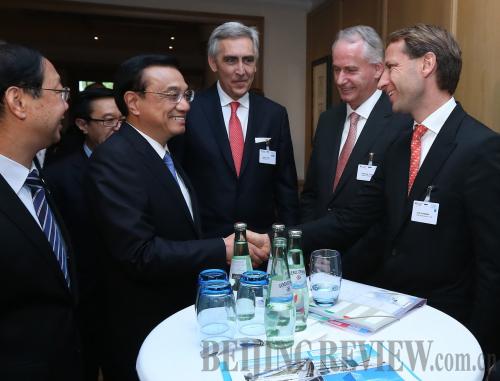|
 |
|
MAKING FRIENDS: Chinese Premier Li Keqiang meets with Chinese and German business leaders in Berlin on May 27 (PANG XINGLEI) |
A majority of EU member states led by Germany opposed the European Commission's proposal to impose punitive duties on imported Chinese solar panels in a survey on May 27, the last day of Chinese Premier Li Keqiang's maiden trip to Europe after assuming his new post in March.
Beyond doubt, Chinese observers said, Li's visit was conducive to reducing the trade barriers between the two large markets, even though the problem cannot be resolved entirely. They added that Li's visit was of great significance in deepening Sino-European economic ties. Notably, the completion of negotiations on a free trade agreement (FTA) between China and Switzerland would not only promote bilateral economic cooperation, but also have a "demonstration effect" for other European countries.
Upgrading economic ties
Observers said Li's recent European trip focused on economic issues, noting the backbone role of Germany in the EU economy and the signing of the Sino-Swiss FTA lent Li's visit a special significance in upgrading China-Europe economic relations.
After nine rounds of negotiations in the last three years, a memorandum of understanding on concluding FTA negotiations between China and Switzerland was finally signed during Premier Li's trip to the European country. Henceforth, Switzerland became the first continental European country and the first among the world's 20 largest economies to sign a free trade pact with China.
Mei Xinyu, a researcher with the Chinese Academy of International Trade and Economic Cooperation, said the pact will be of great benefit to the economic development of both sides.
China is a country that relies heavily on trade. And Switzerland is traditionally an export-oriented country. Their long-standing trade partnership has laid a sound foundation for the FTA, Mei said. More importantly, he added, the economic structures of the two countries are highly complementary, so little economic adjustment is needed to implement the FTA. In addition, with China's economy growing larger and larger, the effect of the bilateral FTA to stimulate the Swiss economy will become more pronounced.
Chen Wenling, chief economist at the China Center for International Economic Exchanges, said the demonstration effect of the Sino-Swiss FTA will show other European countries the benefit of free trade with China. "Against the backdrop of the economic downturn of Europe, enhancing economic cooperation with China is necessary for European countries," Chen said.
Observers said the bilateral FTA may play a positive role in promoting the overall economic cooperation between China and Europe.
"With its unique role in Europe, Switzerland could serve as a bridge between China and Europe. The FTA may help Chinese enterprises further explore the European market," Mei said.
Mei also noted that the FTA essentially means Switzerland has recognized China's market economy status, a move that is crucial to the stable development of Chinese foreign trade.
Though Switzerland is not an EU member, it has wide economic cooperation with the bloc. In 2008, Switzerland became the 27th member of Schengen Agreement, which further facilitates its economic contacts with the EU. Currently, as the latter still has many restrictions on Chinese enterprises and products, Switzerland could become a foothold for Chinese enterprises and products to enter the EU market.
Qu Xing, President of the China Institute of International Studies, said that because of Switzerland's unique position in Europe as neither a EU member nor a euro-zone country, Li's visit demonstrated China's aim to develop a comprehensive relationship with Europe. In addition, though China and Switzerland have maintained a positive official relationship, the Swiss public knows little about China. The visit could also help deepen mutual understanding.
| 